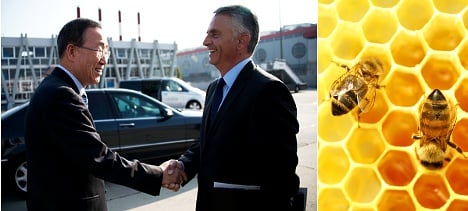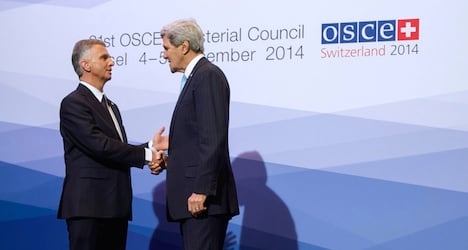Swiss Foreign Affairs Minister Didier Burkhalter presented the gift – an apiary – to UN Secretary General Ban Ki-moon in a ceremony on the grounds of the Ariana Park near the Palais des Nations.
Ban donned a protective mask to inspect the ten bee hives, which are expected to produce 700 kilograms of honey next year.
The UN will use the honey for gifts to guests.
The Swiss government said the symbolic gift was in keeping “not only with the concerted efforts of the UN to conserve biodiversity but also with Switzerland’s own objectives in the field”.
Several years ago, the Swiss cabinet defended the importance of beekeeping, not just as an economic activity but for the role it plays in maintaining the ecological balance and protecting crop yields by pollinating plants and flowers.
Each of the hives is decorated in the national colours of Switzerland and bears an inscription of a UN objective.
In 2002, Switzerland became the 190th member of the UN.
Burkhalter later delivered a speech at the University of Geneva in the presence of Ban in which he called on the UN to do more to promote peace and to make reforms to improve the international organization.
“Great work has been done,” he said. “Useful, necessary but insufficient.”
It is necessary, he said “to work harder, to be still more committed to our values”.
Burkhalter said Switzerland joined the UN to champion its values, including the promotion of human rights, democracy, peace, the fight against poverty and the protection of the environment and natural resources.
As part of his official visit to Switzerland, the UN’s Ban is speaking to the Swiss parliament in Bern on Tuesday.



 Please whitelist us to continue reading.
Please whitelist us to continue reading.
Member comments